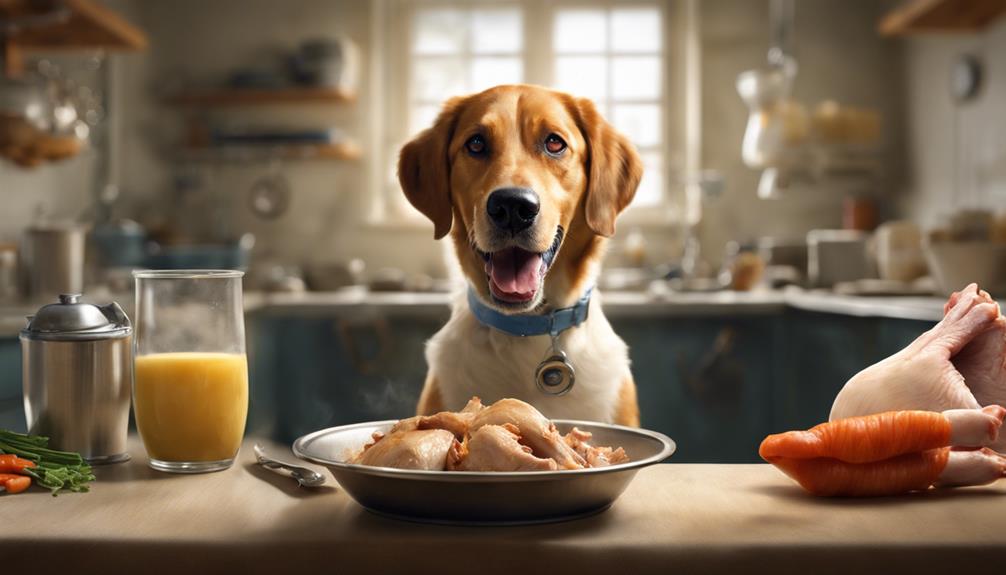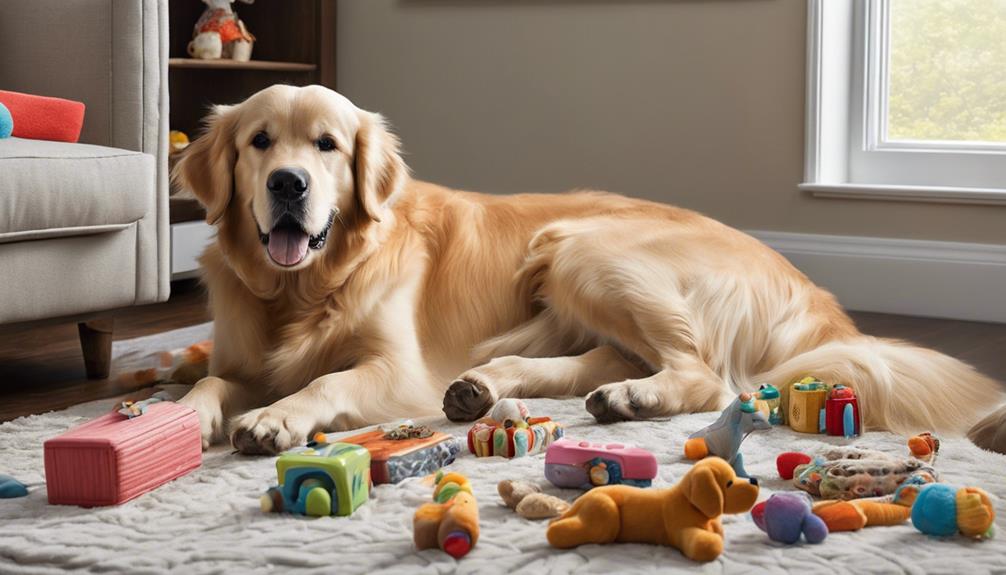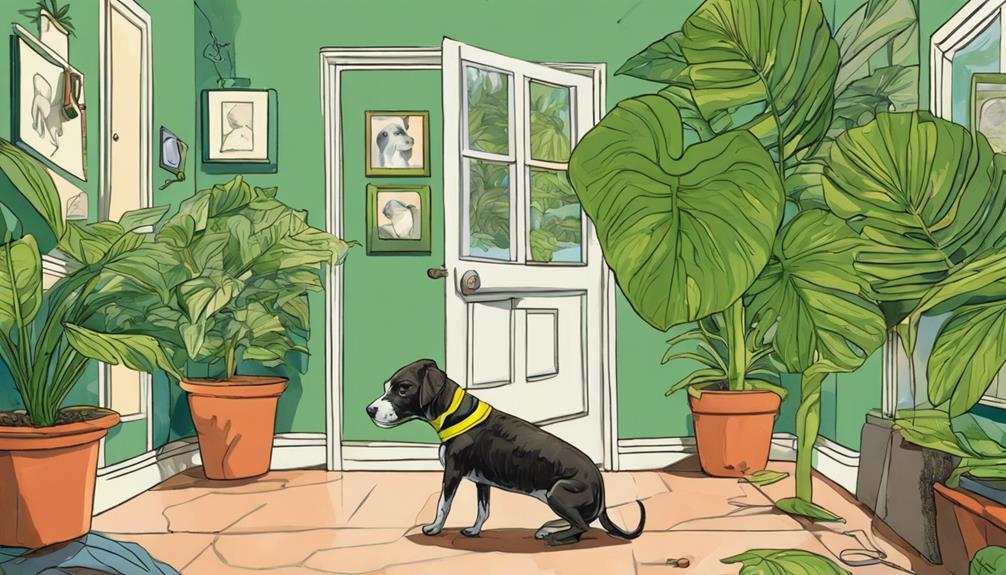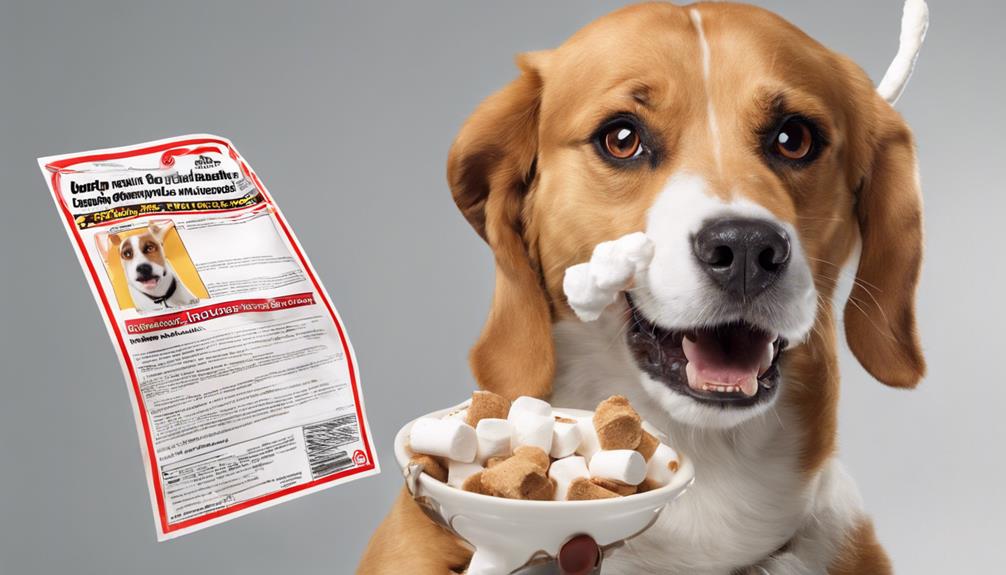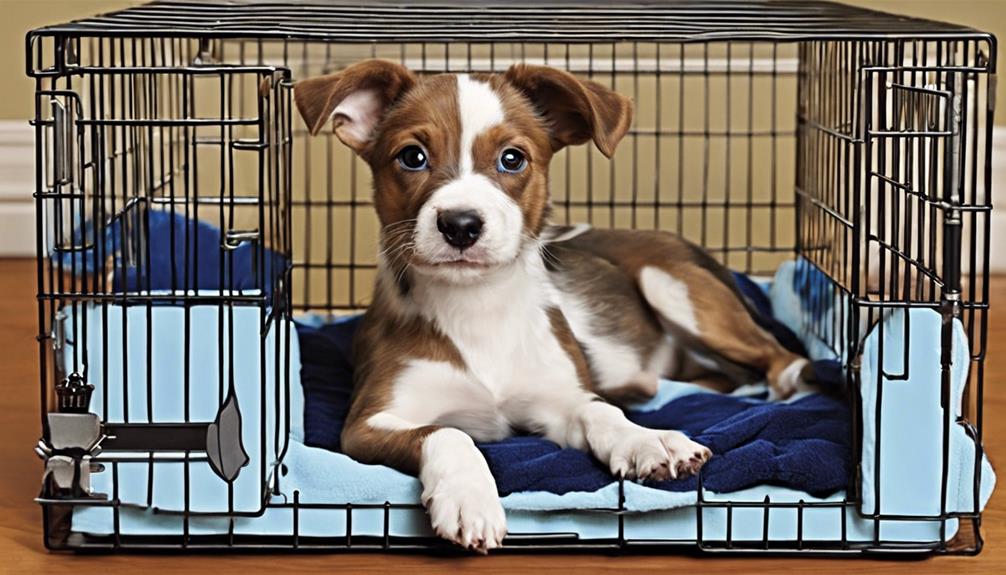Yes, dogs can eat chicken safely. Make sure it's cooked well and boneless. Avoid giving them raw chicken to prevent sickness. Plain chicken is best; don't add onions or garlic. Be careful with chicken bones to prevent choking. Ask a vet for guidance. Cooked chicken is safer than raw due to fewer risks. Stick to boiled chicken without skin for a healthy diet. Avoid fried chicken and nuggets because they are high in fat. Chicken feet may cause tummy problems. If your dog has adverse reactions, consult a vet. Learn more about feeding guidelines for your furry friend's safety.
Key Takeaways
- Cook chicken thoroughly, boneless, and plain for safe consumption.
- Avoid raw chicken and bones to prevent bacterial infections and choking hazards.
- Consult a vet for safe chicken incorporation and allergic reactions.
- Monitor for adverse reactions like vomiting or diarrhea from chicken.
- Ensure balanced protein intake with chicken as a source in moderation.
Chicken Safety for Dogs
When providing chicken to dogs, make sure it's cooked and boneless to offer a safe source of protein and essential nutrients. Raw chicken poses risks of bacterial infections like salmonella, so it's best avoided. Cooked chicken not only eliminates this risk but also ensures your furry friend gets the protein and vitamins they need for a healthy diet.
Remember, seasoning like onion or garlic can be toxic to dogs, so keep the chicken plain. Additionally, steer clear of chicken bones as they can splinter easily, potentially causing choking or digestive issues. If you're unsure about how to incorporate chicken into your dog's diet safely, consulting a veterinarian is a wise move.
Raw Vs. Cooked Chicken

Choosing between raw and cooked chicken for your dog's diet involves considering important factors such as bacterial contamination and food safety. Raw chicken poses a higher risk of harmful bacteria like salmonella, which can lead to foodborne illnesses in dogs. On the other hand, cooking chicken thoroughly eliminates these harmful bacteria, making it a safer option for your furry friend. While dogs have a lower risk of contracting salmonella from raw chicken compared to humans, it's still important to prioritize their health and safety by opting for cooked chicken.
Feeding dogs raw chicken can introduce risks such as bacterial contamination, potentially causing health issues. It's essential to avoid raw chicken bones as they can splinter and cause harm to your dog's digestive system. By choosing cooked chicken, you can guarantee that your dog's meals are free from harmful bacteria, reducing the chances of foodborne illnesses and promoting their overall well-being. Remember, when it comes to your dog's diet, safety always takes precedence.
Chicken Products for Dogs
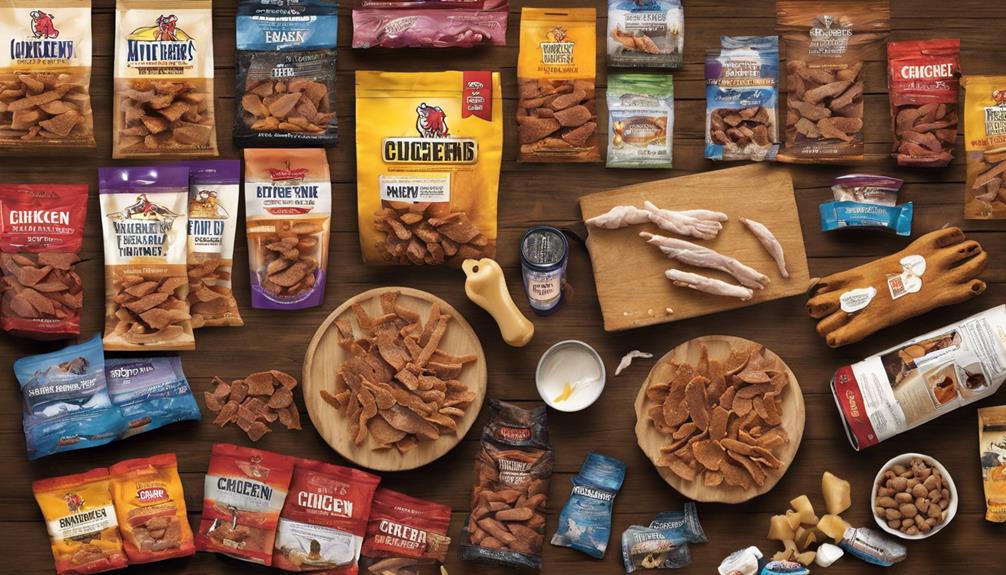
When considering chicken products for dogs, it's important to be mindful of their nutritional value and potential health implications. Plain boiled chicken is a good source of protein for dogs and can be a healthy snack option when given in small amounts. However, fried chicken should be avoided due to its high-fat content and potentially toxic seasonings. Similarly, chicken nuggets aren't a recommended food choice for dogs, especially if they're fried. Chicken feet may cause digestive issues in dogs and carry the risk of harmful bacteria.
If you choose to offer your dog chicken broth, make sure it's plain and low in sodium. This can be a flavorful addition to their food in moderation. Remember that when it comes to feeding your dog chicken products, simplicity is key. Stick to plain, boiled chicken and avoid heavily processed or seasoned options to make sure your furry friend enjoys a healthy and balanced diet.
Potential Risks of Chicken

When feeding your canine friend chicken, it's important to be aware of the potential risks involved. Salmonella contamination is a significant concern with raw chicken, which can lead to severe illness in dogs.
Additionally, seasonings and marinades used in chicken dishes may contain ingredients like garlic and onions that are toxic to dogs, causing harm to their health.
Salmonella Contamination Risk
Reducing the risk of Salmonella contamination in dogs from chicken can be achieved by purchasing high-quality chicken and practicing proper food handling.
Dogs are less susceptible to Salmonella from raw chicken than humans, but precautions should still be taken. Opt for chicken from reputable sources to lower the risk. Always cook chicken thoroughly before feeding it to your furry friend, as raw chicken carries a higher risk of Salmonella.
Implement good kitchen hygiene by keeping raw chicken separate from other foods and cleaning surfaces thoroughly.
Seasoning and Marinades Effects
To guarantee the safety of your dog when feeding them chicken, it's crucial to be mindful of the potential risks associated with using seasonings and marinades.
- Toxic seasonings, such as those containing garlic and onion, can be harmful to dogs.
- These toxic seasonings may lead to symptoms like vomiting, diarrhea, and gastrointestinal upset in dogs.
- Garlic and onion powder found in seasonings can cause damage to your dog's red blood cells.
- To ensure the safety of your furry friend, opt for plain, unseasoned chicken when preparing their meals.
Allergies to Chicken in Dogs

Dogs can develop allergies to chicken, showing signs like vomiting, diarrhea, and skin issues. If your furry friend exhibits these symptoms, consulting a veterinarian for proper diagnosis and treatment is crucial.
Allergy testing can confirm if your dog is sensitive to chicken, and adjusting their diet can help manage allergic reactions effectively.
Chicken Allergy Symptoms
Experiencing chicken allergy symptoms in dogs can manifest as vomiting, diarrhea, skin problems, and itching.
- Gastrointestinal Upset: Dogs allergic to chicken may experience vomiting and diarrhea.
- Skin Irritations: Allergic reactions can cause itchy skin, hair loss, and ear infections in dogs.
- Visible Signs: Watch for redness, swelling, or hives on your dog's skin, indicating a potential chicken allergy.
- Veterinary Consultation: If you notice these symptoms, consult a vet promptly for proper diagnosis and guidance on managing chicken allergies in your furry friend.
Managing Allergic Reactions
Upon observing allergic reactions in your dog to chicken, promptly seek veterinary guidance for proper management. Allergic reactions may manifest as vomiting, diarrhea, or skin problems. A veterinarian can help diagnose the allergy through testing.
If your dog is allergic to chicken, adjusting their diet to eliminate chicken may be necessary. Managing allergic reactions is vital for your dog's health and well-being. By working with a veterinarian, you can develop a plan to mitigate these reactions and guarantee your dog's comfort.
Allergy Testing Options
When dealing with allergies to chicken in dogs, exploring various allergy testing options is essential for identifying and managing potential food sensitivities. Here are some key points to take into account:
- Allergy testing can help confirm if a dog is allergic to chicken.
- Symptoms of chicken allergies in dogs may include vomiting, diarrhea, and skin issues.
- Consulting a vet for allergy testing can provide insights into a dog's food sensitivities.
- Adjusting the diet to avoid allergens like chicken can help manage allergic reactions in dogs.
Observing and monitoring for allergic reactions can guide dietary changes for dogs sensitive to chicken. It's vital to work closely with a vet to make certain the best care for your furry friend.
Feeding Guidelines for Chicken
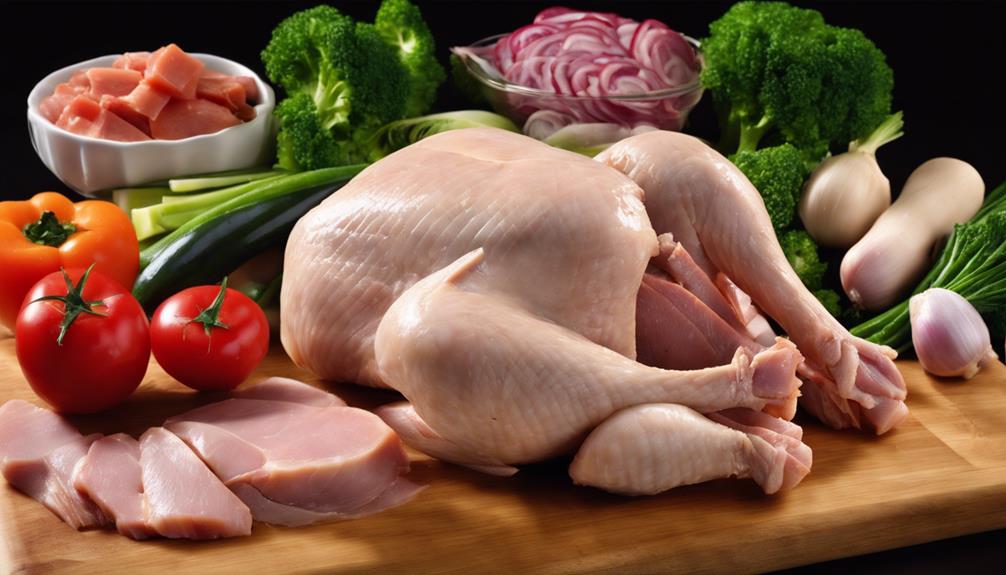
When incorporating chicken into a dog's diet, it is crucial to follow specific feeding guidelines to ensure their nutritional needs are met appropriately. Here are some key points to keep in mind:
| Guidelines | Recommendations | Importance |
|---|---|---|
| Foods to Offer | Cooked, unseasoned chicken as a treat or meal topper. | Provides a good source of protein for your dog's diet. |
| Chicken Consumption | Should not exceed 10% of a dog's daily diet without consulting a vet. | Balances nutrient intake and prevents dietary imbalances. |
| Portion Sizes | 1/4–1/3 cup of meat protein per 20 pounds of a dog's body weight daily. | Ensures your dog receives adequate protein without overfeeding. |
| Monitoring Adverse Reactions | Watch for any allergies or adverse reactions to chicken consumption such as upset stomach, itchiness, or diarrhea. | Allows for prompt identification of any negative effects on your dog's health. |
Handling Chicken Bones

Handling Chicken Bones requires vigilance and caution to prevent potential harm to our furry companions. When dealing with chicken bones, it's imperative to take specific measures to guarantee your dog's safety:
- Avoid Giving Chicken Bones: Refrain from feeding your dog chicken bones, as they can splinter easily, posing a choking hazard and the risk of puncturing the gastrointestinal tract.
- Monitor Your Dogs: Keep a close eye on your dogs around chicken bones to prevent accidental ingestion. Dogs are curious creatures and may try to chew on bones when unsupervised.
- Provide Safe Chew Toys: Offering safe chew toys as an alternative can help satisfy your dog's urge to chew without the risks associated with chicken bones.
- Seek Veterinary Attention: If your dog does ingest a chicken bone, seek immediate veterinary attention. Professional care is vital to address any potential health risks and safeguard your dog's well-being.
Frequently Asked Questions
Is Chicken Good for Dogs Everyday?
Yes, chicken can be good for dogs every day, as long as it's given in moderation.
It's a healthy protein source and provides essential nutrients like vitamin B6, vitamin B3, and zinc.
Rotating chicken with other proteins helps maintain a balanced diet.
Remember, moderation is key to prevent overconsumption and maintain a healthy weight.
Consulting a veterinarian for specific dietary recommendations when incorporating chicken into your dog's daily diet is advisable.
Can I Feed My Dog Cooked Chicken?
We can absolutely feed our dogs cooked chicken. It's a safe and healthy protein option for them. Just make sure it's plain and boneless to prevent any issues.
Adding cooked chicken to their meals or giving it as a treat can be a great way to keep them happy and healthy. Remember, consulting with a vet for personalized advice on your dog's diet is always a smart move.
How Much Chicken Can You Give a Dog?
We should consider the dog's weight when determining the amount of chicken to give. Monitoring reactions to chicken is essential for the dog's well-being. Portion sizes should be adjusted based on the dog's individual needs. Consulting a vet is wise for tailored dietary advice.
Dogs can have cooked, unseasoned chicken in moderation as a treat or food topper. Remember, balance is key in providing a healthy diet for our furry friends.
What Are 3 Foods Dogs Should Not Eat?
Three foods dogs shouldn't eat include grapes, raisins, and avocado. Grapes and raisins can cause kidney failure, while avocado contains persin that's toxic to dogs.
Additionally, dogs should avoid raw potatoes due to solanine content. These foods can be harmful and should be kept away from our furry friends to safeguard their health and safety.
Being mindful of these potential dangers and making informed choices for our pets is crucial.
Conclusion
To sum up, dogs can safely enjoy cooked chicken in moderation. Remember the saying 'everything in moderation' when feeding your furry friend.
It's important to follow feeding guidelines and avoid giving them raw chicken or bones to prevent potential risks. If you notice any signs of allergies or digestive issues, consult your veterinarian.
By following these guidelines, you can enjoy sharing this lean protein source with your canine companion while keeping them healthy and happy.
